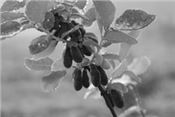|
Missouri Growers Are Sweet On Honey Of A Berry
ELKLAND, MO.
Blueberry is singing the blues. There's a new berry in town. Berry lovers might say “pretty is as pretty does” applies to the flavorful honeyberry. Easy-growing and easygoing, it grows well in a variety of soils, sun and shade. It resists disease and pests.
University of Missouri Extension horticulture specialist Patrick Byers says southwestern Missouri's rocky soil is perfect for honeyberry. Farmers in other states found that honeyberry plants long and strong, with a 50-year life expectancy and the ability to withstand temperatures as low as minus 55 degrees.
The purple-blue, teardrop-shaped berries are half an inch to an inch long. They are the first to bear in spring, even before strawberries.
Honeyberry goes by haskap in Japan and zhimolost in Russia.
B Berry Farms, a U-pick operation in Elkland, Mo., sells 20 different varieties of honeyberry. B Berry also grows a variety of other fruits, including blackberries, raspberries and Goji berries, as well as vegetables. Value-added products include soaps, balms and lotions.
Farm owners Brandon and Teresa-they want their customers to know them on a first-name-only basis-started growing berries for themselves and their children. They now grow up to 4,500 plants on their Webster County farm.
“We wanted more control over how fresh our food was and where it came from,” says Teresa. “That started our journey looking for local food choices.”
When they decided to add honeyberries to their operation in 2015, they cleared rocks, cedar trees and briars from the rocky, clay soil to make way for berry patches. They applied sulfur and peat moss for blueberries the following year.
When they planted 3-year-old honeyberry bushes, they immediately saw some advantages over blueberries. Honeyberry bushes flower earlier than blueberry plants, and the early-ripening, thick-skinned fruit is less vulnerable to spotted wing drosophila The berries grow under the leaves, protecting them from birds, rain and hail.
“We also found that they can thrive in soggy, oxygen-deprived soil,” Teresa says. “Despite being covered in weeds without much sunlight, the plant will still flourish, unlike other berries.”
Honeyberry also tolerates a wide range of soil pH. Brandon and Teresa say the plants did well in soil pH of 5-8, and sometimes even outside that range. They require little maintenance.
Teresa says honeyberries have antioxidants and potassium levels nearly three times higher than blueberries.
Brandon and Teresa use the farm's produce in hundreds of value-added products such as lip balms, tea blends and natural dyes. In addition to running the farm, they both work full-time jobs off-farm.
“We knew there would be many unknown challenges ahead for our family. But isn't that what life is about-just doing what needs to be done?” Teresa says. “Since we opened, we have enjoyed being able to bring friends and families together to a place where their children can run around, enjoy nature and have fun eating a healthy treat.”
Learn more about the farm at bberryfarms.com . ∆

The owners of B Berry Farms in Elkland, Mo., began growing honeyberries and other fresh fruits and vegetables for their family. They now operate a
U-pick farm with a variety of fruits and vegetables, and value-added products such as soaps and lotions.
Photo credits: Patrick Byers

Southwestern Missouri's rocky soil is perfect for growing honeyberry.

Honeyberry bushes bear their teardrop-shaped fruit early in the spring, even before strawberry.
|
|